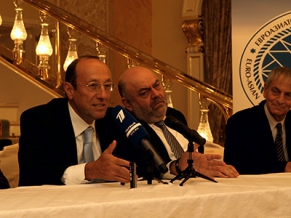|
Euroasian Jewish News

EAJC President Alexander Mashkevich (left),
RJC President Yuri Kanner (right)
|
Meeting of Outstanding Patrons of Jewish Community Life Initiated by EAJC
02.12.2009 On the 2nd of December, at the initiative of the President of the Euro-Asian Jewish Congress (EAJC) Alexander Mashkevich, a meeting of important businessmen who actively support Jewish community life in the FSU took place in Moscow.
The necessity for this meeting was created by the complex of negative factors formed currently, which stem both from the global financial crisis, and by the change in the recent years in the policy of world Jewish funds towards the Jewish communities of the former USSR. These problems dictate the urgent necessity of energetic, consolidated actions by the outstanding patrons of Jewish community life.
The meeting was organized to discuss the main principles and forms of support for Jewish communities in current conditions, to work out a strategic approach to existing problems.
Among those who took part in the meeting were: Alexander Bronshtein, Leon Gandelman, Merab Elashvili, Vitaliy Mashitsky, Yuri Raskin, Michael Skoblionok, Mark Shabad, Edward Shifrin. The Russian Jewish Congress was represented by its President, Yuri Kanner. The Ukrainian Jewish Committee was represented by its leader Alexander Feldman, the Jewish Congress of Moldova – by President Emmanuel Grinshpun, the Jewish Congress of Kazakhstan – by Vice-President Fyodor Osinin.
Part of those patrons invited to the meeting were not able to attend, but, as Alexander Mashkevich announced at the final press-conference, the questions of the meeting were discussed with them before hand, and the discussion will continue in real time during the work following the meeting.
“The main result of our meeting was the decision to create the Coordination Council of patrons of Jewish life in the FSU,” the EAJC President said at the press conference. “The most important thing is that we finally decided to act together, to collectively solve out common problems. The practical form of realization of our convention will be the creation of a Fund which will be able to react immediately both to existing challenges and to the critical situations which arise in the lives of communities. The discussion of legal and organizational forms of the existence of his Fund is a matter of the near future. It is necessary to work everything out clearly, to prepare, and to start acting on particular matters.”
Comments on the results of the meeting by one of its organizators, EAJC Executive Vice-President Yuri Raskin:
“A time ago, the support of Jewish communities of the post-Soviet region by the largest international Jewish organizations, in particular, JAFI, started to decline, and, as became self-evident after the development of the world financial crisis, this is a tendency which will continue. These conditions demand even more active and effective creative action of the leading FSU patrons, which have already taken upon themselves the responsibility for the continued existence of Jewish communities.
This is possible only with a comprehensive collegial appraisal of the problem at hand, and a working out of consolidated solutions. This concerns especially immediate reactions to critical situations which arise in the lives of communities.
Another condition is the necessity of the creation and realization of programs of partnership, and maximal coverage of various directions of community activity with help.
It is apparent that the solution to these problems is possible only through organizing a permanently active mechanism of interaction between outstanding patrons who represent different Jewish organizations and express the largest possible spectrum of benevolent motivations. This is why the Coordination Council which was founded at the meeting must become such a mechanism first and foremost.
The security fund of support for Jewish communities in crisis or in critical situations, the idea of creating which was also discussed at the meeting, is undoubtedly important, but, I must underscore, not the only instrument of solving our problems. Even though the idea imminent in forming such a fund is itself unique for the Jewish communities in the FSU, and infers through its realization a borrowing of the successful experience of Western endowment funds with a division of collective responsibility.”
|
|
